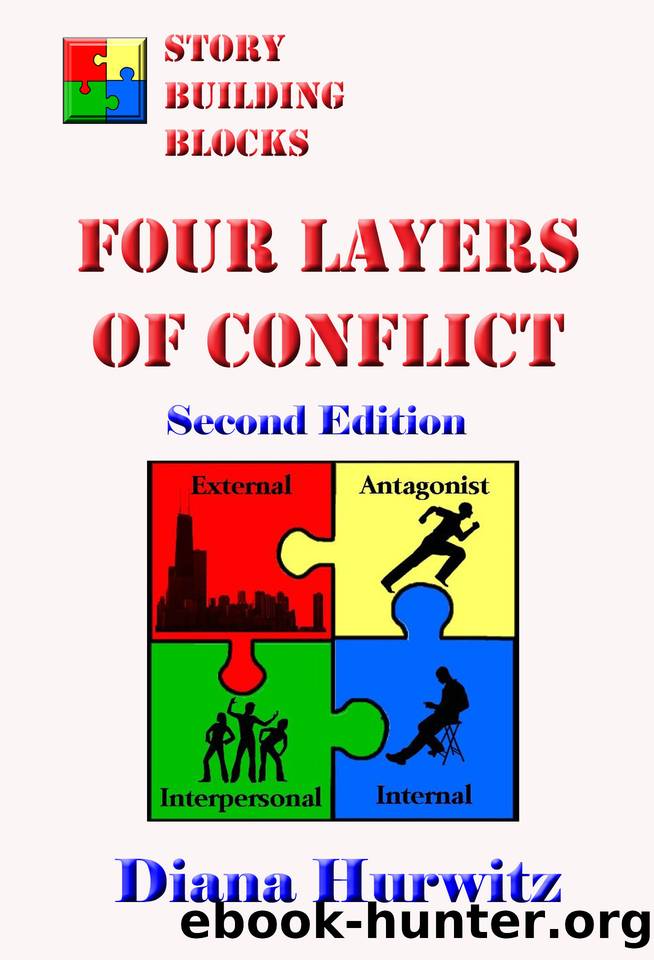Four Layers of Conflict: Story Building Blocks by Hurwitz Diana

Author:Hurwitz, Diana [Hurwitz, Diana]
Language: eng
Format: epub
Publisher: Hurwitz Literary
Published: 2017-05-18T16:00:00+00:00
27 THRILLER & SUSPENSE STRUCTURE
The overall story problem in this genre is catastrophic danger that must be averted. Something comes along to threaten someone or everyone. The protagonist may have brought it upon himself or may be a completely innocent target. The audience may or may not know the identity of the antagonist up front, but they are aware of the source of danger. Someone or something is out to get the protagonist and/or his loved ones.
The villain may be a serial killer, spy, or terrorist. Either way, he must be strongly developed and truly menacing to one or many to make us fear him. The main character is usually in jeopardy.
There are several subgenres of Thriller:
Conspiracy Thrillers unravel the mystery of an organization or powerful group of enemies. The sleuth is the only one who sees the pattern.
Crime Thrillers are a hybrid of Mystery and Thriller that offer suspenseful crimes that either failed or succeeded. They often focus on the criminal instead of the police side of things. They are more action-themed, high octane tales that don’t follow the “sleuth solving crime” framework.
Disaster Thrillers explore natural disasters such as floods, earthquakes, tsunamis, volcanoes, hurricanes, horde of locusts, or a disappearing ozone layer. They can explore threats such as nuclear bombs, genocide, or world war .
Erotic Thrillers combine the Thriller structure with an explicit or twisted romance structure. Usually the protagonist unintentionally invites the crazy person into their lives by having an affair, striking up a friendship, or hiring them to be their nanny.
Legal Thrillers follow a lawyer-protagonist who confronts enemies both inside and outside the courtroom with life and death stakes.
Medical Thrillers feature doctors, other medical personnel, or humanity facing a medical threat such as a rogue virus or a mad scientist bent on genetic experimentation.
Political Thrillers feature protagonists who must save their government or thwart the corrupt government that hires them.
Psychological Thrillers feature a more subtle mind game of cat and mouse.
Religious Thrillers feature either sleuths that are religious figures or plots surrounding religion, religious figures, or religious objects. Often a big secret is revealed that twists accepted knowledge. There can be paranormal elements to these stories.
Supernatural Thrillers feature otherworldly elements mixed with tension, suspense, and plot twists. They often explore topics such as ESP, ghosts, and superhuman capabilities.
Techno Thrillers involve threats that surround technology, particularly technology gone awry: computers that decide to take over, people lost in computer programs, hackers, or war games gone wrong.
Thriller frameworks involve solving crises that lead to bigger, scarier crises. The hero prevents the villain from achieving his goal, but does so at his or her own peril. You really have to convince your audience of the life and death danger or emotional life and death danger. There are twists on the ending of these stories, but the audience prefers the hero to live.
The reader asks: How will they, and by proxy we, survive such an event?
External Conflict scenes include the inciting event, twists, turning points, and climax.
These conflicts test the characters’ courage, nerves, and determination.
Download
This site does not store any files on its server. We only index and link to content provided by other sites. Please contact the content providers to delete copyright contents if any and email us, we'll remove relevant links or contents immediately.
And Here's the Kicker: Conversations with 21 Top Humor Writers on Their Craft by Mike Sacks(1085)
2120-2126 by Russell Fine(941)
Confident Digital Content by Adam Waters(939)
2024-2120 by Russell Fine(930)
Letters to a young poet by Rainer Maria Rilke(797)
You Should Be Writing by Brenda Knight & Brenda Knight(749)
550 AP Calculus AB & BC Practice Questions by Princeton Review(738)
How Tell a Story and Other Essays by Mark Twain(727)
Reading for the Plot by Peter Brooks(703)
Poetics (Penguin Classics) by Aristotle(681)
Letters to a Young Poet (Rediscovered Books) by Rainer Maria Rilke(653)
Cultures and Beyond (The Art of World Building Book 3) by Randy Ellefson(643)
Improve Your Writing with NLP by Judith Pearson(641)
Odessa Stories by Isaac Babel(634)
The George Sand-Gustave Flaubert Letters by George Sand & Gustave Flaubert(629)
The Hidden Writer by Alexandra Johnson(610)
The Story Works Guide to Writing Point of View: How to harness the power of POV and write amazing narratives. (The Story Works Guide to Writing Fiction Book 2) by Winternheimer Alida(603)
Cracking the AP English Literature & Composition Exam, 2015 Edition by Princeton Review(594)
Mastering the Process by Elizabeth George(584)
